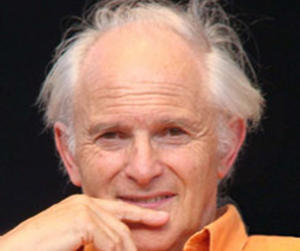
From a cramped office overlooking Florida State University's tennis courts, Nobel Prize-winning chemist Harry Kroto is lecturing to the world through his laptop.
Kroto, 70, is the driving force behind FSU's GEOSET (Global Educational Outreach for Science, Engineering and Technology) program, which uses the Internet to teach youngsters about science, engineering and technology. A small studio next to his office is where the slightly built, yet cracklingly energetic, Englishman prepares the online presentations that students and teachers from Woodville to Malaysia can access with a click of the mouse.
"The Encyclopedia Britannica was it for so long," Kroto said. "But it's nothing compared to what you can learn now by accessing the Internet, Wikipedia, Google - even YouTube.
"It's the biggest revolution of our time," he said. "It's created something new: I call it the GooYouWiki world."
In the later years of an illustrious career that has spanned classrooms and laboratories and that still takes him around the globe with great frequency, Kroto has found a new passion in GEOSET. Teaching over the Internet also allows him to incorporate his other longtime loves for art and graphic design.
Working out of the studio that's part of the university's Department of Chemistry and Biochemistry, Kroto encourages the student scientists he works with to make video presentations of their research and post them on the GEOSET site (geoset.fsu.edu).
Scientific analysis - which formerly would have mostly been shoved into a file cabinet - now can be accessed by students, teachers and fellow researchers worldwide. Original material from scientists around the world, including several of Kroto's former colleagues in England and some of his fellow Nobel laureates, also has been posted on the site.
After working for decades in classrooms, laboratories and now on the Internet, Kroto said teaching remains his real thrill.
"There's something about interacting with students," he said, slouched behind the desk in an office crowded with overflowing file boxes crammed with scientific papers, schedules and souvenirs from his travels.
"(Students) don't like everything I say. They sometimes say they wish that chemistry was easier than it was. All I can say is, 'I'm sorry it's so difficult. But it's worth it.'"
Kroto's career is testament to the power of endurance - and a degree of good fortune.
He won the Nobel Prize in Chemistry in 1996, about a decade after he and two colleagues discovered what they labeled buckminsterfullerene - a molecule composed of 60 carbon atoms shaped like a microscopic soccer ball. Because of their shape, the molecules were named after the architect credited with popularizing the geodesic dome - Buckminster Fuller.
In the chemistry world, the molecules, which are incredibly strong and harder than diamonds, are dubbed "buckyballs." Although their practical value is still largely unknown, numerous potential applications are being pursued worldwide, ranging from the development of solar cells with longer life spans to the creation of lightweight but virtually impenetrable body armor. Scientists even believe that buckyballs might one day be used within the human body as a means of targeting drug delivery to certain locations - tumors, for example.
Kroto's work pioneered what has since become known as fullerene science, which strives toward applying new techniques in materials science and electronics. But Kroto and two of his partners in research were the first to discover the class of compounds.
"Winning the Nobel was a beautiful achievement," said Kroto, an FSU faculty member since 2004. "But no scientist can ever really dream of being handed that card." Still, he adds, "I've never been a guy who had a great regard for my own ability. We found something that was really a backburner discovery that turned out to be something. It doesn't mean I'm the cleverest guy, though."
To all who know him, such modesty comes as no surprise. Kroto prefers that everyone - old friends and new acquaintances alike - call him Harry. This despite the fact that, having been knighted by Queen Elizabeth II in 1996, he now carries the weighty title of Sir Harold Kroto.
Kroto is the sixth Nobel Prize winner to serve on the faculty of Florida State over the years - but currently the only one on campus.
Read the full article from the TALLAHASSEE MAGAZINE HERE
Watch Harry Kroto's Opening Minds lecture series

